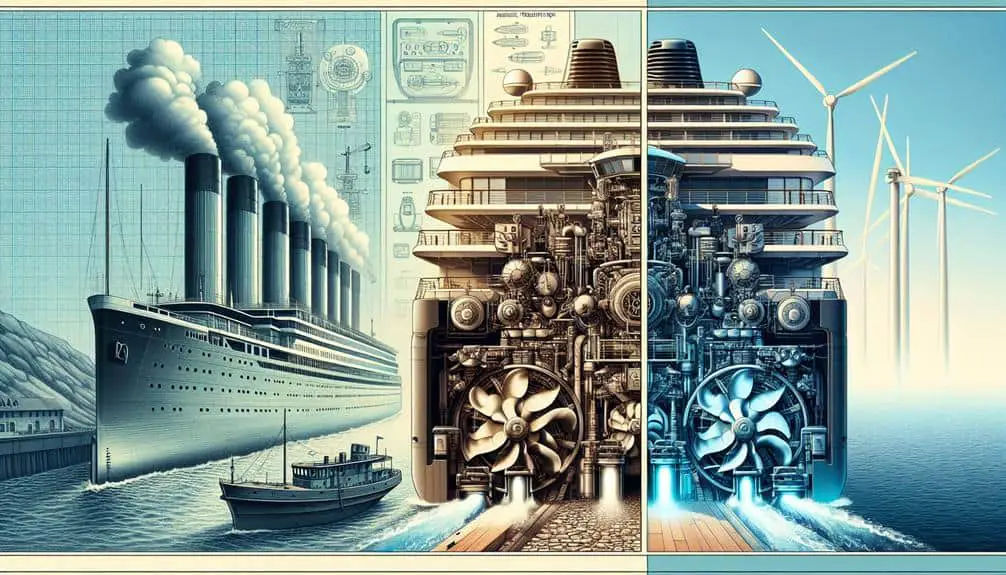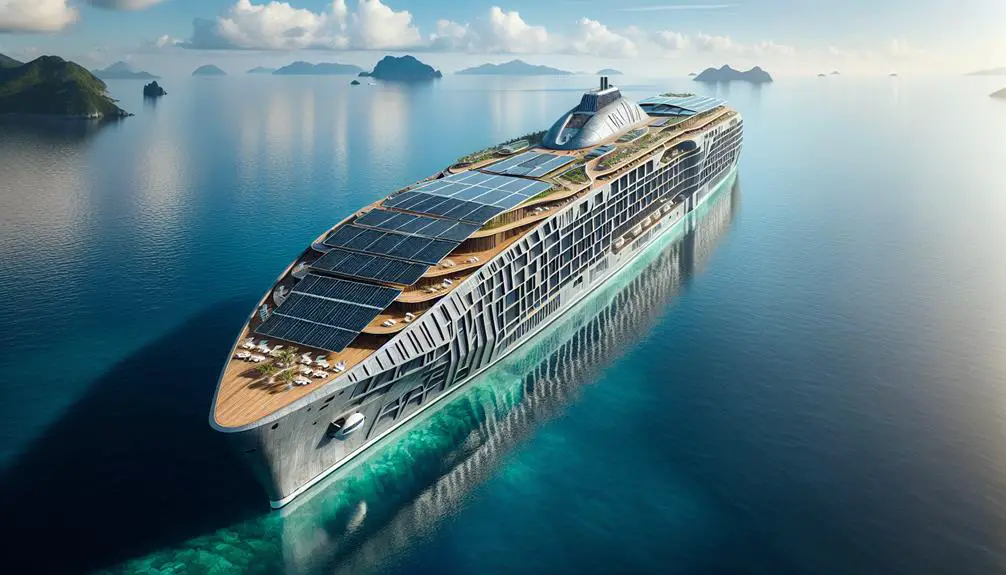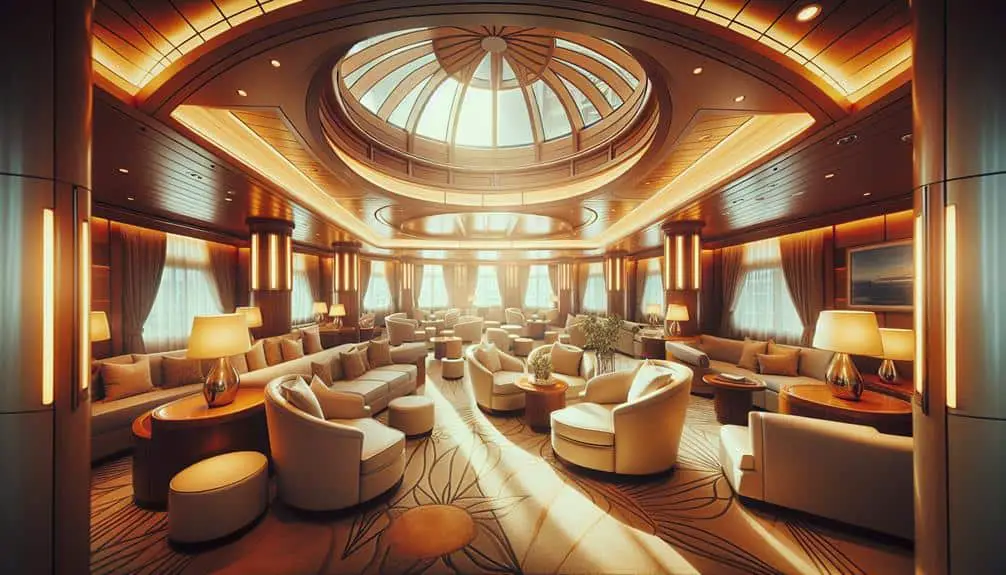Cruise ship propulsion systems are evolving to boost fuel efficiency, decrease environmental impact, and fulfill strict emission regulations. The goal is to optimize operational performance and cut costs effectively. Advanced diesel engines and gas turbines are boosting efficiency, while integrated power management systems are enhancing power distribution. These modern systems deliver more power while using less fuel, improving speed, maneuverability, and overall efficiency. By adopting sustainable practices and alternative fuels, cruise lines are embracing an environmentally conscious and cost-effective future. Sustainable fuel options like LNG, hydrogen fuel cells, and biofuels are gaining momentum, offering significant reductions in greenhouse gas emissions.
Key Points
- Environmental concerns drive the need for sustainable propulsion systems.
- Technological advances improve fuel efficiency and operational costs.
- Regulations push for cleaner propulsion technologies to reduce pollution.
- Evolution towards alternative fuels for lower emissions and sustainability.
- Future trends focus on environmentally friendly and efficient propulsion solutions.
Historical Development of Cruise Ship Propulsion
The historical development of cruise ship propulsion began with the early experiments in marine engineering during the 19th century. Steam engines were the first major breakthrough in cruise ship propulsion. These engines converted thermal energy into mechanical work by boiling water to produce steam. The steam was then directed to drive a turbine or reciprocating engine, which turned the ship's propellers. This innovation revolutionized the maritime industry by providing reliable power for long voyages.
As technology advanced, diesel-electric systems emerged as a more efficient and environmentally friendly alternative to steam engines. Diesel-electric propulsion systems use diesel generators to produce electricity, which then powers electric motors connected to the propellers. This setup offers better fuel efficiency, lower emissions, and increased flexibility in power distribution throughout the ship.
The shift from steam engines to diesel-electric systems marked a significant milestone in the evolution of cruise ship propulsion, paving the way for modern vessels to operate more sustainably and economically.
Environmental Concerns and Regulations
Amidst the evolution of cruise ship propulsion systems, a pressing concern arises regarding the environmental impact and regulatory frameworks governing maritime operations. Emission standards have become a focal point in the industry, driving the need for sustainable practices to minimize the ecological footprint of cruise ships. Stricter regulations aimed at reducing marine pollution have been implemented to guarantee regulatory compliance and safeguard delicate marine ecosystems.
In response to these environmental concerns and regulations, cruise lines are increasingly investing in technologies that enhance sustainability. From adopting cleaner fuels to implementing advanced exhaust gas cleaning systems, the industry is actively seeking ways to meet emission standards and reduce its impact on the environment. Additionally, initiatives focusing on waste management and recycling onboard have become paramount to ensure regulatory compliance and minimize pollution in sensitive marine areas.
Technological Advances in Propulsion Systems
With advancements in propulsion systems, cruise ship technology has undergone significant transformations to enhance efficiency and performance. Fuel efficiency has been a primary focus, driving innovation in propulsion systems. New technologies, such as advanced diesel engines and gas turbines, have emerged to increase fuel efficiency by optimizing combustion processes and reducing energy losses. These systems are designed to deliver higher power output while consuming less fuel, resulting in reduced emissions and operating costs.
Power output is another critical aspect that has seen improvements through technological advances. Modern propulsion systems utilize integrated power management systems that efficiently distribute power based on demand, ensuring peak performance across varying operating conditions. By enhancing power output capabilities, cruise ships can achieve higher speeds, better maneuverability, and increased overall efficiency.
Efficiency and Cost Savings
Enhancing efficiency and achieving cost savings are paramount goals in the evolution of cruise ship propulsion systems. Fuel efficiency plays a critical role in reducing operational expenses and environmental impact. By optimizing propulsion systems to consume fuel more effectively, cruise lines can lower their overall operational costs to a great extent. Improved fuel efficiency not only reduces the financial burden but also aligns with the industry's sustainability efforts.
In addition to fuel efficiency, minimizing maintenance costs is another key focus area. Advanced propulsion systems that require less frequent maintenance and repairs can lead to substantial cost savings over the lifespan of a cruise ship. By investing in cutting-edge technologies that are durable and reliable, cruise operators can enhance operational efficiency while reducing downtime and associated maintenance expenses.
Efficiency and cost savings go hand in hand when it comes to cruise ship propulsion systems. Implementing strategies to improve fuel efficiency and reduce maintenance costs not only benefits the bottom line but also ensures smoother operations and enhanced environmental stewardship.
Future Trends in Cruise Ship Propulsion
To explore upcoming advancements in cruise ship propulsion, we shift our focus towards the future trends shaping the evolution of propulsion systems in the maritime industry. Sustainability innovations are at the forefront of these trends, driving the development of propulsion systems that are environmentally friendly and energy-efficient. One of the key areas of focus is the integration of alternative fuels to reduce emissions and minimize the ecological footprint of cruise ships.
Innovations in propulsion technology are paving the way for the adoption of alternative fuels such as liquefied natural gas (LNG), hydrogen fuel cells, and biofuels. These sustainable fuel options offer significant reductions in greenhouse gas emissions compared to traditional marine fuels. Additionally, advancements in hybrid propulsion systems, combining traditional fuels with electric propulsion, are gaining traction in the industry.
The future of cruise ship propulsion lies in the continued exploration and implementation of sustainable practices and alternative fuels. By embracing these advancements, the maritime industry can move towards a more environmentally conscious and efficient future.
Frequently Asked Questions
What Are the Potential Impacts of Cruise Ship Propulsion Systems on Marine Wildlife and Ecosystems?
When contemplating cruise ship propulsion systems, it is vital to weigh the potential impacts on marine wildlife and ecosystems. Marine conservation efforts are indispensable for biodiversity protection. Monitoring and regulating ship emissions can mitigate harm.
How Do Cruise Ship Propulsion Systems Compare to Other Modes of Transportation in Terms of Carbon Emissions and Environmental Impact?
You should analyze cruise ship propulsion systems compared to other transportation modes for energy efficiency and environmental impact. By comparing carbon emissions and sustainability, you'll gain insights into the industry's advancements and challenges.
Are There Any Safety Concerns or Risks Associated With the Latest Technological Advances in Cruise Ship Propulsion Systems?
Safety concerns can arise with the latest technological advancements in cruise ship propulsion systems. Risks include potential system failures, fires, and environmental impacts. Stay informed, conduct thorough inspections, and prioritize safety protocols to mitigate these risks effectively.
How Do Cruise Ship Companies Ensure the Proper Maintenance and Upkeep of Their Propulsion Systems to Maximize Efficiency and Minimize Downtime?
To guarantee peak performance of propulsion systems, cruise ship companies employ rigorous maintenance practices. By embracing cost-effective solutions and optimizing efficiency, downtime is minimized. Continuous monitoring and timely servicing keep propulsion systems running smoothly, maximizing operational efficiency.
What Role Do Government Regulations Play in Shaping the Future of Cruise Ship Propulsion Systems, and How Likely Are We to See Stricter Regulations in the Coming Years?
Government regulations heavily influence the future of cruise ship propulsion systems. Stricter rules are likely due to environmental impacts. Technological innovations will be necessary to meet these demands, driving the evolution of propulsion systems.




